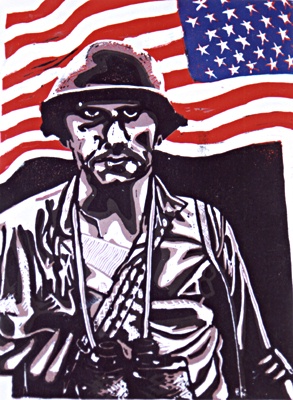All Nonfiction
- Bullying
- Books
- Academic
- Author Interviews
- Celebrity interviews
- College Articles
- College Essays
- Educator of the Year
- Heroes
- Interviews
- Memoir
- Personal Experience
- Sports
- Travel & Culture
All Opinions
- Bullying
- Current Events / Politics
- Discrimination
- Drugs / Alcohol / Smoking
- Entertainment / Celebrities
- Environment
- Love / Relationships
- Movies / Music / TV
- Pop Culture / Trends
- School / College
- Social Issues / Civics
- Spirituality / Religion
- Sports / Hobbies
All Hot Topics
- Bullying
- Community Service
- Environment
- Health
- Letters to the Editor
- Pride & Prejudice
- What Matters
- Back
Summer Guide
- Program Links
- Program Reviews
- Back
College Guide
- College Links
- College Reviews
- College Essays
- College Articles
- Back
The Things They Carried by Tim O'Brien
In Tim O’ Brien’s The Things They Carried, fear is an emotion that lives through the lives of the soldiers. This emotional phenomenon evokes a theme blurred between truth and fiction. Fiction is needed to tell the truth, and the truth is hard to tell beneath the weight of fear.
Fear becomes a burden that every soldier carries, because it is inevitable on the battlefield: “They carried their reputations. They carried the soldier’s greatest fear, which was the fear of blushing. Men killed, and died, because they were embarrassed not to” (O’Brien 20). Soldiers value false pretensions over possible loss of dignity, because hiding behind an image is easier than admitting weakness. Conforming to the norm is their duty, and revealing fear would be a soldier’s first casualty. So instead they wrestle with it in silence, and save face for the sake of society. It is a truth that is smothered by lies.
Fear, however, is also inevitable off the battlefield. As the narrator, Tim O’ Brien, epitomizes soon after he finds out he has been unknowingly drafted for the Vietnam War: “What would you do? Would you jump? Would you feel pity for yourself? Would you think about your family and your childhood and your dreams and all you're leaving behind? Would it hurt? Would it feel like dying? Would you cry, as I did?” (O’Brien 54). These are questions asked amongst the shadows of the unknown. They are the truths that nobody wants to ask, and they are the apprehensions of the innocent. War has gotten greedy and turned Tim O’ Brien’s life upside down. He had already envisioned his future ambitions, and war was not part of his plan. It veers him off course, and forces him to think about life and death in a way he never has before. Tim O’ Brien has to let go of his childhood, his morals, and perhaps the person he thought he knew, and that is what scares him the most.
Flash-forward, the war has ended, but Norman Bowker’s has not. Norman Bowker is a soldier, who has trouble making the transition from war to everyday life. He drives around in endless circles in hopes of gaining insight, but he can’t find his emotional truth, as Tim O’ Brien describes: “He wished he could've explained some of this. How he had been braver than he ever thought possible, but how he had not been so brave as he wanted to be. The distinction was important.” (O’Brien 147). Norman Bowker holds himself accountable for his friend Kiowa’s death, because he wasn’t able to save him. He is not able to make peace with himself, because peace has become an elusive concept. War has changed Norman Bowker’s definition of what it means to be brave, and in some ways, what it means to be afraid. Being afraid is simply when he hasn’t been able to be brave, and that is one truth he fears he can never change.
Fear comes in many forms. It is the thing that the soldiers’ carry masked under everything else. It is the thing that the soldiers carry when questions become too much. Most of all, though, fear is the thing that soldiers carry when they don’t know how else to admit the painfully honest truth, which is harder to hold then a lie.

Similar Articles
JOIN THE DISCUSSION
This article has 0 comments.

This is an essay I wrote based on Tim O' Brien's The Things They Carried. It discusses fear, an emotion that lives in the lives of the soldiers in the book.